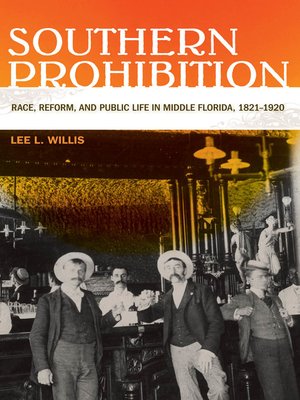Southern Prohibition
ebook ∣ Race, Reform, and Public Life in Middle Florida, 1821-1920
By Lee L. Willis

Sign up to save your library
With an OverDrive account, you can save your favorite libraries for at-a-glance information about availability. Find out more about OverDrive accounts.
Find this title in Libby, the library reading app by OverDrive.



Search for a digital library with this title
Title found at these libraries:
| Library Name | Distance |
|---|---|
| Loading... |
Southern Prohibition examines political culture and reform through the evolving temperance and prohibition movements in Middle Florida. Scholars have long held that liquor reform was largely a northern and mid-Atlantic phenomenon before the Civil War. Lee L. Willis takes a close look at the Florida plantation belt to reveal that the campaign against alcohol had a dramatic impact on public life in this portion of the South as early as the 1840s.
Race, class, and gender mores shaped and were shaped by the temperance movement. White racial fears inspired prohibition for slaves and free blacks. Stringent licensing shut down grog shops that were the haunts of common and poor whites, which accelerated gentrification and stratified public drinking along class lines. Restricting blacks' access to alcohol was a theme that ran through temperance and prohibition campaigns in Florida, but more affluent African Americans also supported prohibition, indicating that the issue was not driven solely by white desires for social control. Women in the plantation belt played a marginal role in comparison to other locales and were denied greater political influence as a result.
Beyond alcohol, Willis also takes a broader look at psychoactive substances to show the veritable pharmacopeia available to Floridians in the nineteenth century. Unlike the campaign against alcohol, however, the tightening regulations on narcotics and cocaine in the early twentieth century elicited little public discussion or concern—a quiet beginning to the state's war on drugs







